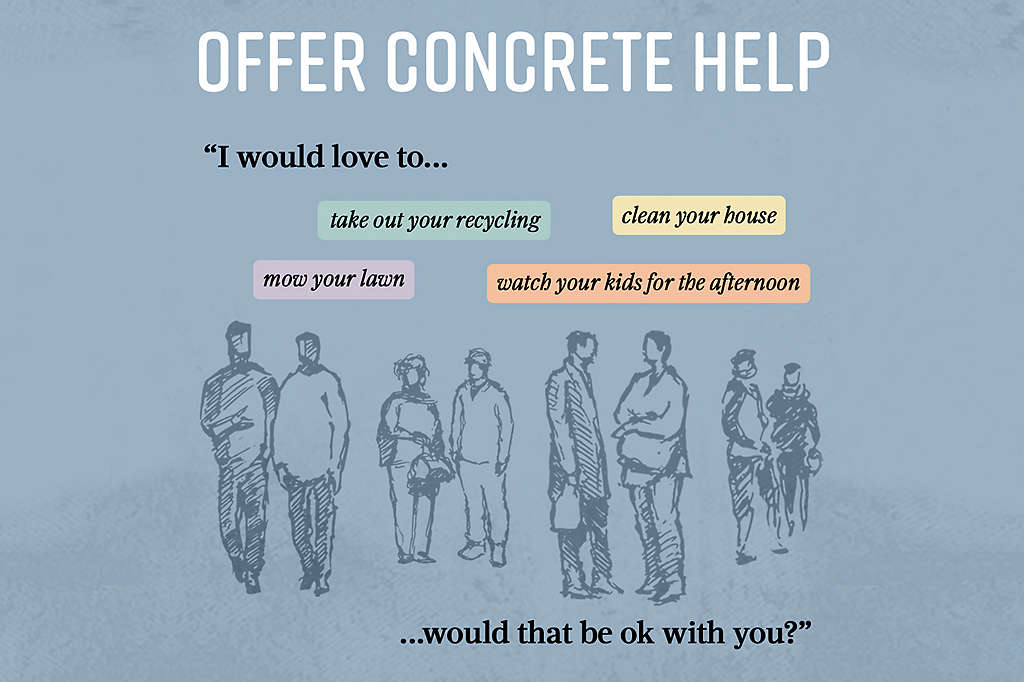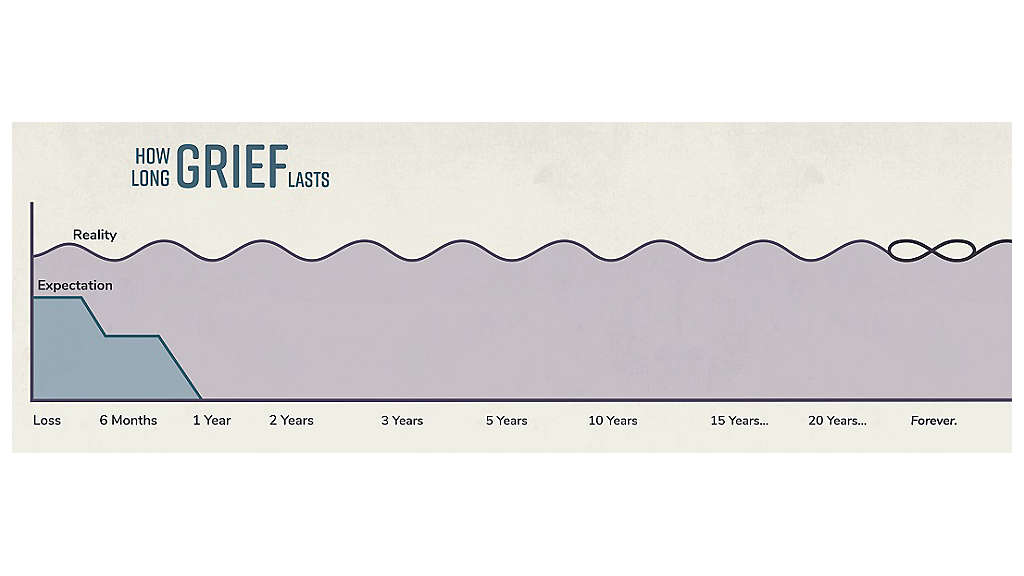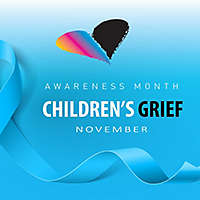BEREAVEMENT RESOURCES
Let's get better at grief


By: Lindsey Fenton
Senior Producer at WPSU Penn State, Partner of the New York Life Foundation
There’s no one-size fits all approach to supporting someone who’s grieving.
Grief is universal, but it's also unique. A person’s grief is shaped by a million different factors and no two people will grieve the same way. Because it’s such an individual experience, there’s no one-size fits all approach to supporting someone who’s grieving. How can we become more comfortable holding space for grief without being able to know exactly what to do when we encounter it?
While there’s no cheat sheet, there are some fairly universal practices that can help us do grief better.
Show up.
We can’t offer support if we don’t show up. Sounds easy, right? Too many grieving people have stories of friends and family members vanishing—to the point of literally running away from them in the grocery store. We can’t let our fear of making a mistake stop us from showing up.
Approach with curiosity rather than judgment.
No two people will grieve exactly alike, so no matter how well we might know someone, we can’t fully understand what it’s like to be them in their grief experience. This means that we need to avoid making assumptions about what they’re feeling. Even if we’ve experienced a similar type of loss, resist the urge to say things like “I understand” or “I know how you feel.” Instead, try something like, “What’s this experience like for you?”
Keep the focus on the grieving person.
In conversations about grief, we often attempt to empathize by sharing our own loss experience(s). We do this to try to connect with our grieving person, but what it actually does is shift the focus away from them and on to us. Instead of sharing right away, offer it as an option for when they're ready. It could be something as simple as, "I've also experienced loss, if you ever want to hear about it, I'd be happy to share it with you."
Your job as a support person isn’t to make somebody feel happy; it’s to make somebody feel heard.
Megan Devine
Be authentic.
Grief is hard and weird and awkward—for everybody. Take comfort in the fact that no one expects us to have all the answers. In fact, the best thing we can do when trying to offer grief support is to acknowledge reality by saying something like, “I have no idea what to say or do, but I care about you and I’m here for you.” That simple statement will go over far better than offering unsolicited advice or trying to cheer the person up. And, this leads us to one of the most important grief support tips...
Beware of platitudes.
We’ve all said the things. Everything happens for a reason. God only gives you what you can handle. At least you had them for as long as you did. And, we’ve all meant well when we’ve said these things. But we probably didn’t realize that, instead of offering comfort, these phrases are actually all ways of saying, “You shouldn’t be feeling what you are feeling.”
Here’s the hard, but important truth when it comes to watching someone we love in pain: we can’t fix it. And, when we try to fix it is when we get into trouble. This may seem counterintuitive, but please: let your person have their pain. Don’t try to take it away. Don’t try to put a silver lining on it. All that will do is make them feel dismissed and you feel frustrated.
We need to recalibrate our idea of grief support. Our goal is not to fix things for our person or to cheer them up. Our goal is to hold space for them by acknowledging their pain, validating their experience, and assuring them that they are not alone.
Say the person’s name.
Here’s another biggie: when we’re talking about death-related grief: say the person who died’s name. We tend to think that if we bring the person up, we’re going to remind our grieving person that their loved one is gone. But we aren’t reminding them of anything; they know their person is gone. When we say their name, we remind our grieving friend that their person is not forgotten.

Credit: Steve Nelson
Offer concrete help.
Grief can be disorienting and using the standard "Let me know if you need anything" is an impossible request to a grieving person.
To borrow a phrase from Christina Chipriano, LCSW-S, the director of Spanish Outreach and Programs at Bo’s Place, “Expecting the person who's bereaved to be able to identify what they need from you is like giving a non-mathematician a very complex math problem and telling them, ‘Figure out the answer and then let me know what it is.’”
Grief can do all sorts of things to our brains. Our grieving person likely doesn’t have the mental capacity to discern what they need. And, if they are able to perform that herculean task, they then have to put themselves in the vulnerable position of asking for help.
Instead of “Let me know if you need anything,” we can offer concrete ways we are willing and able to help our person. Phrase it as a question, so we’re still getting consent: “I would like to clean your apartment for you, would that be OK?” Or, “I’d love to come by Saturday and take the kids for the day so you can have some time to yourself, does that sound good?”
Be flexible.
Grief changes hour to hour, sometimes minute to minute. What felt good to our grieving person last week might not work for them this week. So, when we’re trying to be supportive, we need to be aware that our person may not know exactly what they need. They may change their mind. They may cancel plans. Remember that this is their first time going through this particular loss, so they are trying to figure things out, too. Let’s try to be patient and understanding.


Credit: Sarah Bodnar
Keep at it.
Grief lasts much, much longer than we have been taught. We need to continue to be there for our person in the weeks, months, and years after the loss. We may not need to show up as frequently, but we do still need to show up.
Maybe they no longer need someone to mow the lawn for them, but they likely still need someone they can count on to hold space when the need arises—someone who recognizes that grief ebbs and flows. Someone who won’t make comments like “You’re still upset about this?” Or, “It’s time to move on.”
Even if we need to set reminders for ourselves to check in with them, that’s OK. It doesn't make our support any less genuine if we rely on prompts to reach out. A simple, "Hey, I'm thinking of you" text message can be a powerful thing.
We can be better at grief.
The hardships of 2020 have started to bring grief out of the shadows. We’re beginning to recognize how often we grieve and how much pain everyone around us is carrying. There is a growing awareness that being human can be really hard and an appreciation for kindness, compassion, and community. This is the perfect time to reexamine our societal norms; to take stock of where we are so we can learn to love better. And, to do grief better.
For more, check out Speaking Grief, a multiplatform, public initiative aimed at creating a more grief-aware society that was produced by WPSU and philanthropically supported by the New York Life Foundation.
RELATED CONTENT
Subscribe
Want to learn more about grief resources?
Enter your email address below, and we’ll keep you informed about the latest bereavement resources and tools.
Thank you for subscribing!



